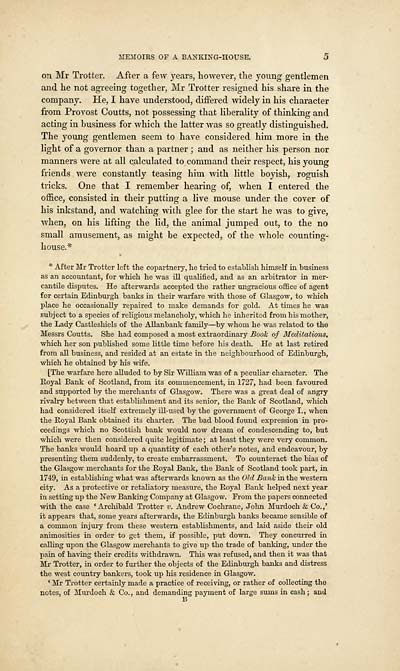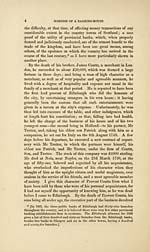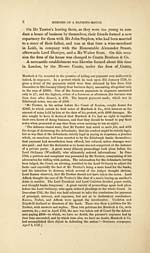Memoirs of a banking-house
(27) Page 5
Download files
Complete book:
Individual page:
Thumbnail gallery: Grid view | List view

MEMOIRS OF A BANKING-HOUSE. 5
on Mr Trotter. After a few years, however, tlie young gentlemen
and he not agreeing together, Mr Trotter resigned his share in the
company. He, I have understood, differed widely in his character
from Provost Coutts, not possessing that liberality of thinking and
acting in business for which the latter was so greatly distinguished.
The young gentlemen seem to have considered him more in the
light of a governor than a partner ; and as neither his person nor
manners were at all calculated to command their respect, his young
friends were constantly teasing him with little boyish, roguish
tricks. One that I remember hearing of, when I entered the
office, consisted in their putting a live mouse under the cover of
his inkstand, and watching with glee for the start he was to give,
when, on his lifting the lid, the animal jumped out, to the no
small amusement, as might be expected, of the whole counting-
house.*
* After Mr Trotter left the copartnery, he tried to establish himself in business
as an accountant, for which he was ill qualified, and as an arbitrator in mer-
cantile disputes. He afterwards accepted the rather ungracious office of agent
for certain Edinburgh banks in their warfare with those of Glasgow, to which
place he occasionally repaired to make demands for gold. At times he was
subject to a species of religious melancholy, which he inherited from his mother,
the Lady Castleshiels of the Allanbank family — by whom he was related to tho
Messrs Coutts. She had composed a most extraordinary Book of Meditations,
which her son published some little time before his death. He at last retired
from all business, and resided at an estate in the neighbourhood of Edinburgh,
which he obtained by his wife.
[The warfare here alluded to by Sir "William was of a peculiar character. The
Eoyal Bank of Scotland, from its commencement, in 1727, had been favoured
and supported by the merchants of Glasgow. There was a great deal of angry
rivalry between that establishment and its senior, the Bank of Scotland, which
had considered itself extremely ill-used by the government of George I., when
the Royal Bank obtained its charter. The bad blood found expression in pro-
ceedings which no Scottish bank would now dream of condescending to, but
which were then considered quite legitimate ; at least they were very common.
The banks would hoard up a quantity of each other's notes, and endeavour, by
presenting them suddenly, to create embarrassment. To counteract the bias of
the Glasgow merchants for the Royal Bank, the Bank of Scotland took part, in
1749, in establishing what was afterwards known as the Old Bank in the western
city. As a protective or retaliatory measure, the Royal Bank helped next year
in setting up the New Banking Company at Glasgow. From the papers connected
with the case ' Archibald Trotter v. Andrew Cochrane, John Murdoch & Co.,'
it appears that, some years afterwards, the Edinburgh banks became sensible of
a common injury from these western establishments, and laid aside their old
animosities in order to get them, if possible, put down. They concurred in
calling upon the Glasgow merchants to give up the trade of banking, under the
pain of having their credits withdrawn. This was refused, and then it was that
Mr Trotter, in order to further the objects of the Edinburgh banks and distress
the west country bankers, took up his residence in Glasgow.
' Mr Trotter certainly made a practice of receiving, or rather of collecting the
notes, of Murdoch & Co., and demanding payment of large sums in cash; and
on Mr Trotter. After a few years, however, tlie young gentlemen
and he not agreeing together, Mr Trotter resigned his share in the
company. He, I have understood, differed widely in his character
from Provost Coutts, not possessing that liberality of thinking and
acting in business for which the latter was so greatly distinguished.
The young gentlemen seem to have considered him more in the
light of a governor than a partner ; and as neither his person nor
manners were at all calculated to command their respect, his young
friends were constantly teasing him with little boyish, roguish
tricks. One that I remember hearing of, when I entered the
office, consisted in their putting a live mouse under the cover of
his inkstand, and watching with glee for the start he was to give,
when, on his lifting the lid, the animal jumped out, to the no
small amusement, as might be expected, of the whole counting-
house.*
* After Mr Trotter left the copartnery, he tried to establish himself in business
as an accountant, for which he was ill qualified, and as an arbitrator in mer-
cantile disputes. He afterwards accepted the rather ungracious office of agent
for certain Edinburgh banks in their warfare with those of Glasgow, to which
place he occasionally repaired to make demands for gold. At times he was
subject to a species of religious melancholy, which he inherited from his mother,
the Lady Castleshiels of the Allanbank family — by whom he was related to tho
Messrs Coutts. She had composed a most extraordinary Book of Meditations,
which her son published some little time before his death. He at last retired
from all business, and resided at an estate in the neighbourhood of Edinburgh,
which he obtained by his wife.
[The warfare here alluded to by Sir "William was of a peculiar character. The
Eoyal Bank of Scotland, from its commencement, in 1727, had been favoured
and supported by the merchants of Glasgow. There was a great deal of angry
rivalry between that establishment and its senior, the Bank of Scotland, which
had considered itself extremely ill-used by the government of George I., when
the Royal Bank obtained its charter. The bad blood found expression in pro-
ceedings which no Scottish bank would now dream of condescending to, but
which were then considered quite legitimate ; at least they were very common.
The banks would hoard up a quantity of each other's notes, and endeavour, by
presenting them suddenly, to create embarrassment. To counteract the bias of
the Glasgow merchants for the Royal Bank, the Bank of Scotland took part, in
1749, in establishing what was afterwards known as the Old Bank in the western
city. As a protective or retaliatory measure, the Royal Bank helped next year
in setting up the New Banking Company at Glasgow. From the papers connected
with the case ' Archibald Trotter v. Andrew Cochrane, John Murdoch & Co.,'
it appears that, some years afterwards, the Edinburgh banks became sensible of
a common injury from these western establishments, and laid aside their old
animosities in order to get them, if possible, put down. They concurred in
calling upon the Glasgow merchants to give up the trade of banking, under the
pain of having their credits withdrawn. This was refused, and then it was that
Mr Trotter, in order to further the objects of the Edinburgh banks and distress
the west country bankers, took up his residence in Glasgow.
' Mr Trotter certainly made a practice of receiving, or rather of collecting the
notes, of Murdoch & Co., and demanding payment of large sums in cash; and
Set display mode to:
![]() Universal Viewer |
Universal Viewer | ![]() Mirador |
Large image | Transcription
Mirador |
Large image | Transcription
Images and transcriptions on this page, including medium image downloads, may be used under the Creative Commons Attribution 4.0 International Licence unless otherwise stated. ![]()
| Histories of Scottish families > Memoirs of a banking-house > (27) Page 5 |
|---|
| Permanent URL | https://digital.nls.uk/95087238 |
|---|
| Description | A selection of almost 400 printed items relating to the history of Scottish families, mostly dating from the 19th and early 20th centuries. Includes memoirs, genealogies and clan histories, with a few produced by emigrant families. The earliest family history goes back to AD 916. |
|---|

